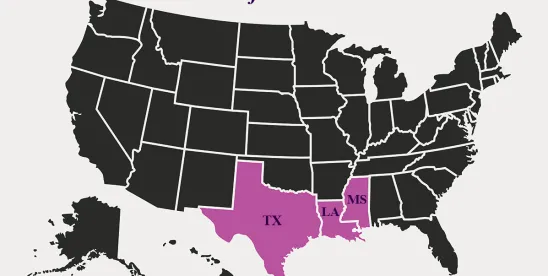The United States District Court for the Northern District of Texas last week issued an order and opinion granting a preliminary injunction staying the effective date for enforcement of the Federal Trade Commission’s (“FTC”) rule banning most non-competes for workers (“Non-Compete Ban”). The order, issued in Ryan, LLC v. FTC (C.A. No. 3:24-cv-00986), enjoins the FTC from implementing or enforcing the Non-Compete Ban until the court makes a final decision on the merits, which the court indicated that it would do on August 30, 2024. Without court intervention, the Non-Compete Ban is due to become effective on September 4, 2024.
The court granted injunctive relief only for the named Plaintiff, Ryan, LLC, and the individual trade associations who actually intervened in the action, including the U.S. Chamber of Commerce and the Business Roundtable (“Intervenors”). The court declined to enter a nationwide injunction or to grant injunctive relief for the members of the Intervenors because the Intervenors did not brief the issue of associational standing, limiting the scope of injunctive relief to the specific parties before the court. On July 10, 2024, Ryan, LLC and the Intervenors filed an expedited Motion for Reconsideration on the Scope of Preliminary Relief on these issues.
While awaiting the August 30, 2024, final ruling in the Ryan litigation, there are other cases pending that are likely to result in rulings on the Non-Compete Ban, including in the United States District Court for the Eastern District of Pennsylvania (expected on July 23, 2024) and the United States District Court for the Middle District of Florida. Until there is a more definitive ruling from the courts, including and up through the U.S. Supreme Court, there are steps employers can take in advance of the effective date as the litigation over the Non-Compete Ban continues to play out.
The Ryan Preliminary Injunction Opinion Finds a High Likelihood of Success on the Merits That the FTC Lacked Authority to Issue the Non-Compete Ban and That the Non-Compete Ban Is Arbitrary and Capricious
In granting the preliminary injunction, the court found that Ryan, LLC and the Intervenors had carried the heavy burden required to obtain preliminary injunctive relief, holding that they successfully showed: (1) a substantial likelihood of success on the merits, (2) the presence of irreparable harm in the absence of injunctive relief, (3) that the balance of harms weighed in plaintiffs/intervenors favor, and (4) that issuing the injunction served the public interest. The court’s rationale indicated that its final ruling on the merits would likely reach the same conclusion and noted that “in some ways, [the standard for granting] the permanent injunction is less demanding than the preliminary injunction.”
Likelihood of Success. The court found that Ryan, LLC and the Intervenors were likely to succeed for two main reasons: (1) the FTC lacked the authority under the FTC Act to issue the Non-Compete Ban; and (2) the Non-Compete Ban is “arbitrary and capricious” under the Administrative Procedure Act. Specifically, the court held that:
- the FTC lacks substantive rulemaking authority under the FTC Act to create substantive rules regarding “unfair methods of competition,” finding that Section 6(g) is merely a “housekeeping statute” permitting the FTC to make “rules of agency organization procedure or practice” and not substantive rules. The court found that a plain reading of the statute, the lack of any statutory penalty for violation of Section 6(g), and the fact that it is among a list of 12 “almost entirely investigative powers” showed that Section 6(g) grants the FTC “investigatory or ministerial” powers and not the authority to issue a substantive rule like the Non-Compete Ban. The court also examined legislative history and amendments to the FTC Act, which it held further demonstrated the FTC’s lack of authority.
- under the Administrative Procedure Act (“APA”), the Non-Compete Ban is “arbitrary and capricious” in light of the fact that “it is unreasonably overbroad without a reasonable explanation,” as “[i]t imposes a one-size-fits-all approach with no end date which ‘fails to establish a rational connection between the facts found and the choice made.’” The court also found that the Non-Compete Ban was “based on inconsistent and flawed empirical evidence” that failed “to consider the positive benefits of non-compete agreements” and that it disregarded a “substantial body of evidence supporting these agreements.” In short, the court found that there was a “lack of evidence as to why [the FTC] chose to impose such a sweeping prohibition—that prohibits entering or enforcing virtually all non-competes—instead of targeting specific, harmful non-competes.” The court further found that the FTC failed to address alternatives to issuing such a broad rule, and failed to conduct any analysis that would consider less disruptive alternatives, merely “concluding that either the pro-competitive justifications outweighed the harms, or that employers had other avenues to protect their interests.”
Irreparable Harm. The court found that the irreparable harm articulated by both Ryan, LLC and the Intervenors was essentially unopposed by the FTC and included the costs of providing notice and the time and resources necessary to update and change existing agreements to counteract the Non-Compete Ban. The court found such financial injury and nonrecoverable compliance costs constitute irreparable harm as a matter of law.
Balance of Equities and Public Interest. The court found that the injury to Ryan, LLC and the Intervenors would be significant, and that the preliminary injunction would serve the public interest by maintaining the status quo and preventing the substantial economic impact of the Non-Compete Ban, while simultaneously inflicting no harm at all on the FTC. Specifically, the court found that the Non-Compete Ban “makes unenforceable long-standing contractual agreements that have been judicially recognized as lawful and beneficial to the public interest.”
Merits Decision by August 30, 2024. The court stated that it would make a final determination on the merits by August 30, 2024. Based on its preliminary injunction analysis, that decision will likely conclude that the Non-Compete Ban is invalid as a matter of law. Given the Supreme Court’s recent rejection of the Chevron deference doctrine in Loper Bright Enterprises, Inc. v. Raimondo (No. 22-451), signaling that courts will no longer be required to defer to the FTC’s own interpretation of the FTC Act, particularly in the absence of Congressional action on non-competes on a nationwide basis, the FTC’s views will probably not be given weight. Thus, it is not likely that a court will blindly endorse the FTC’s own interpretation.
Narrow Scope of Ryan Preliminary Injunction
Injunction Limited to the Parties Before the Court. The Ryan court declined to issue an injunction or to stay the effective date of the Non-Compete Ban on a nationwide basis and, instead, entered the interim injunction only as to the parties before the court, Ryan, LLC and the Intervenors. The court declined to issue broader relief in favor of the members of the Intervenors (i.e., the member companies of the U.S. Chamber of Commerce or the Business Roundtable) because the Intervenors did not brief the issue of associational standing. Thus, the decision in Ryan is limited in scope, leaving some uncertainty as to the effective date of the Non-Compete Ban for other companies; the court is expected to issue its final merits-based decision on August 30, 2024, that certainty (if it is to come in Ryan) will come only five days before the anticipated effective date of September 4, 2024. On July 10, 2024, Ryan, LLC and the Intervenors filed a expedited Motion for Reconsideration, arguing that the scope of the injunctive relief should be nationwide under the APA and it should be extended to apply to the members of the Intervenors.
Additional Rulings Expected Prior to the Effective Date
While it is likely the final merits ruling in Ryan will declare the Non-Compete Ban unconstitutional, we anticipate that either another district court or a circuit court of appeals (should a ruling be appealed) will clarify that the effective date is stayed pending appeal even if the final merits decision in Ryan is characterized narrowly by the court. Regardless, the Non-Compete Ban faces significant headwinds after the FTC’s loss of its first battle in Ryan.
On July 10, 2024, the United States District Court for the Eastern District of Pennsylvania in ATS Tree Services, LLC v. FTC held oral argument on a similar motion for preliminary injunctive relief and has indicated that it will issue a ruling on July 23, 2024.
In addition, on July 2, 2024, the Properties of the Villages, Inc. filed a Motion for Stay of Effective Date and Preliminary Injunction in federal court in Florida. In that case, the FTC has obtained an extension until July 25, 2024, to respond to the motion, and the Properties of the Villages, Inc. has emphasized the urgency of its motion and noted in its response to the request for extension that the court issue a decision in advance of the scheduled September 4, 2024, effective date to avoid incurring unrecoverable costs and irreparable harm.
Either of those courts could potentially impose a nationwide injunction on the Non-Compete Ban or, alternatively, either could rule in the FTC’s favor, creating a split on the constitutionality of the Non-Compete Ban if it breaks from the Ryan court’s analysis.
Practical Tips Given the Uncertainty Surrounding the Effective Date
The uncertainty about the effective date of the Non-Compete Ban and nationwide injunctive relief is unfortunate, but there are practical steps that can be taken in the meantime, including the following.
- If you are a member of the U.S. Chamber of Commerce or Business Roundtable, contact them to ensure associational standing and the need for nationwide injunctive relief are addressed before the Ryan court.
- Contact other trade associations and encourage them to mount litigation challenges to the Non-Compete Ban on behalf of members.
- Consider private litigation options, including intervening in the Ryan litigation or filing a private action challenging the Non-Compete Ban.
- Continue to monitor any current or former workers that may be subject to a non-compete agreement, continue to send cease-and-desist letters to preserve rights and remedies, and consider filing lawsuits to enforce non-competes if necessary given the carve out in the Non-Compete Ban for causes of action that accrue prior to its effective date.
- Stay the course because, in all likelihood, the Non-Compete Ban will ultimately be delayed or invalidated before it is ever effective.
- Do some pre-planning for the worst case and consider potential new approaches for non-competes that are compliant with the Non-Compete Ban were it ever to become effective: (i) using a form of garden leave that keeps employees on payroll with full pay and benefits, which the FTC has blessed; (ii) using fixed-duration or term-of-service contracts, which the FTC has blessed; or (iii) using equity-based covenants triggered by the redemption of workers’ vested equity interests but subject to a negotiated valuation and buyout (as opposed to a mandatory procedure not subject to negotiation), which possibly may be outside of the scope of the Non-Compete Ban.
- Reconsider (or delay, until clarity exists) equity awards or substantial severance packages if the absence of the protection provided by a non-compete is meaningful and given the potential inability to seek rescission or repayment if the Non-Compete Ban were to become effective.
- Delay issuing any notice to current or former workers rescinding or voiding their non-competes until it is required and while the legal matters continue to play out, as such notices are likely irreversible.
In addition, though not a desirable outcome, companies are no doubt considering the risks of not complying with the Non-Compete Ban. The FTC has limited remedies at its disposal for enforcement, including injunctive relief, but it has no clear statutory authority to seek monetary remedies or penalties in this context. Technically, there is also not a private right of action for litigants to enforce the Non-Compete Ban. In addition, companies will remain able to litigate the enforceability of a particular non-compete and to address the constitutionality of the Non-Compete Ban on a case-by-case basis, which may outweigh the risks of FTC enforcement, particularly given the decision in Ryan and hopefully other decisions issued before the effective date. For that reason, companies may consider doing nothing, thereby avoiding what the Ryan court characterized as “nonrecoverable compliance costs.”
Upcoming Key Dates
July 23, 2024: The Eastern District of Pennsylvania is scheduled to issue a ruling on the motion for preliminary injunction in ATS Tree Services, LLC v. FTC.
July 25, 2024: The FTC has until July 25, 2024, to file its response to the motion for stay of the effective date and preliminary injunction in the Middle District of Florida in Properties of the Villages, Inc. v. FTC.
August 30, 2024: The Northern District of Texas is scheduled to issue a final ruling on the merits in Ryan, LLC v. FTC.
September 4, 2024: The FTC’s Non-Compete Ban is scheduled to go into effect, requiring that notice be provided to impacted employees that the post-employment non-competes they entered into are no longer enforceable.
We will continue to monitor the developments of the FTC’s Non-Compete Ban as it is challenged and litigated, and its effect on businesses and recruitment throughout the United States.





 />i
/>i

